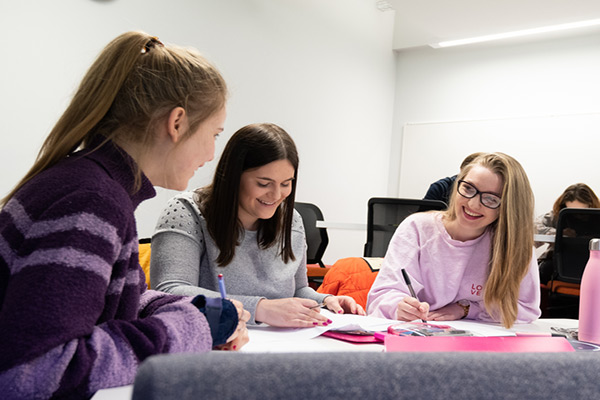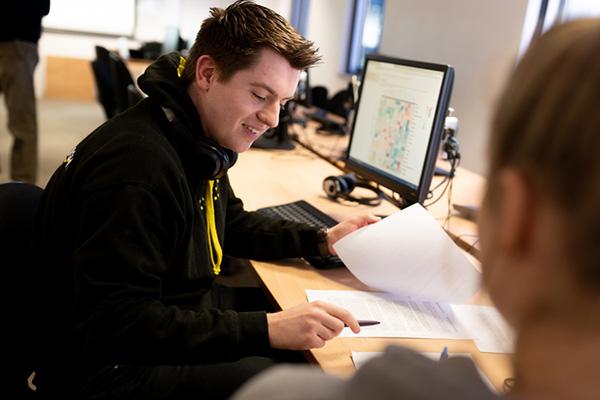
Understand how we use and acquire language to solve real-life problems and interact with others throughout the lifespan across different settings and cultures.
Year of entry: 2024 (September)
1 year full-time,
2 years part-time
September 2024 (semester dates)
Join us online or in person to find out more about postgraduate study at York.
Upcoming eventsApplied Linguistics is concerned with how people use and acquire language in the real world and how language is used to solve real-life problems
The development, acquisition, and learning of language and interaction in all stages of life constitute fascinating yet complex areas of study in constant innovation.
On this programme, you'll discover a range of theories and methods for the study of language development and language use in social interaction, including bilingualism and multilingualism, second language acquisition and processing, language attrition, and multimodal conversation analysis.
The programme offers two unique areas of specialisation within Applied Linguistics: Language Development, and Conversation Analysis. You will be able to choose to specialise in one of the pathways, or study both throughout the programme.

You can study both, or specialise in, a unique area of applied linguistics: language development and conversation analysis.
The Department is part of York's Faculty of Arts and Humanities, ranked 40th in the 2020 Times Higher Education World University Rankings.
This course offers two unique areas of specialisation within Applied Linguistics: Language Development, and Conversation Analysis. You will be able to choose to specialise in one of the pathways, or study both throughout the programme.
In Semester 1 you will take three modules: one core module, one or both pathway-specific modules, plus a general module (if you only take one pathway module).
In Semester 2 you will take three modules: one or both pathway-specific modules, plus another option module (or two, if you only take one pathway module). The options available to you may be limited by the choices you make in Semester 1.
Our modules may change to reflect the latest academic thinking and expertise of our staff.
Over the Summer session, you'll work on your final dissertation. You'll be able to attend a range of valuable workshops to support you during your project.
Previous research topics have included:
Every course at York is built on a distinctive set of learning outcomes. These will give you a clear understanding of what you will be able to accomplish at the end of the course and help you explain what you can offer employers. Our academics identify the knowledge, skills, and experiences you'll need upon graduation and then design the course to get you there.
 The support from the staff, especially those lecturers who I have had contact with, has been excellent. I have always been welcomed into their offices to talk about both academic and personal aspects. During the masters degree, I constantly asked myself a question: and now? what's next? Staff in the department have given me excellent advice and encouraged me to trust myself.Eloi, Language and Linguistic Science student.
The support from the staff, especially those lecturers who I have had contact with, has been excellent. I have always been welcomed into their offices to talk about both academic and personal aspects. During the masters degree, I constantly asked myself a question: and now? what's next? Staff in the department have given me excellent advice and encouraged me to trust myself.Eloi, Language and Linguistic Science student.Read more on what our students say about us.
| Study mode | UK (home) | International and EU |
|---|---|---|
| Full-time (1 year) | £10,590 | £23,900 |
| Part-time (2 years) This is the year 1 fee. Fees for future years are subject to confirmation. |
£5,555 | £12,540 |
Students on a Student Visa are not currently permitted to study part-time at York.
For courses which are longer than one year, the tuition fees quoted are for the first year of study.
UK (home) or international fees? The level of fee that you will be asked to pay depends on whether you're classed as a UK (home) or international student. Check your fee status.
Find out more information about tuition fees and how to pay them.
Discover your funding options to help with tuition fees and living costs.
We'll confirm more funding opportunities for students joining us in 2024/25 throughout the year.
If you've successfully completed an undergraduate degree at York you could be eligible for a 10% Masters fee discount.
You can use our living costs guide to help plan your budget. It covers additional costs that are not included in your tuition fee such as expenses for accommodation and study materials.
You’ll work with world‐leading academics who’ll challenge you to think independently and excel in all that you do. Our approach to teaching will provide you with the knowledge, opportunities, and support you need to grow and succeed in a global workplace.
You'll be taught with a mixture of lectures, seminars, workshops and practical training. You'll typically have two or three contact hours a week for each module. In addition, you'll work independently, reading assigned texts and research papers, and completing work to prepare for classes and to submit for assessment. For some modules, you’ll complete collaborative group work outside your classes.
Teaching is classroom-based. In addition, we have our own departmental e-Lab for classes that require computers and for students' private study use. Here you will have access to a variety of resources, including specialist linguistics software and corpora of different varieties.
All of our modules have Virtual Learning Environment (VLE) websites where all crucial materials. Reading lists, handouts, discussion boards are accessible.
You will be based in the Department of Language and Linguistic Science on Campus West. Some of your contact hours will be in or close to Vanbrugh College, and all of your teaching will be on Campus West.
Our beautiful green campus offers a student-friendly setting in which to live and study, within easy reach of the action in the city centre. It's easy to get around campus - everything is within walking or pedalling distance, or you can always use the fast and frequent bus service.
You'll complete a variety of assessments, including dossiers of exercises and open exams as well as other formats, such as presentations, transcriptions and analyses of conversational data, lab reports, and 3,000-word essays. You'll also complete weekly exercises and assignments that will give you useful feedback on your progression.


This course supports your employability by fostering practical and technical skills that are highly desirable in both academia and in the current work market. Through the work conducted during the programme, which includes design and management of an independent research project, you will be equipped to exercise independent learning in your future careers. Our MA also provides excellent training for doctoral research.
| Typical offer | |
|---|---|
| Undergraduate degree | 2:1 or equivalent |
| Other international qualifications | Equivalent qualifications from your country |
If English isn't your first language you may need to provide evidence of your English language ability. We accept the following qualifications:
| Minimum requirement | |
|---|---|
| IELTS (Academic and Indicator) | 7.0, minimum 6.5 in each component |
| Cambridge CEFR | C1 Advanced: 185, with 176 in each component |
| Oxford ELLT | 8, minimum 7 in each component |
| Duolingo | 130, minimum 120 in all other components |
| LanguageCert SELT | C1 with 33/50 in each component |
| LanguageCert Academic | 75 with a minimum of 70 in each component |
| KITE | 495-526, with 459-494 in all other components |
| Skills for English | C1: Pass overall, with Pass in each component |
| PTE Academic | 67, minimum 61 in each component |
| TOEFL | 96, minimum 23 in each component |
| Trinity ISE III | Distinction in all component |
For more information see our postgraduate English language requirements.
You may be eligible for one of our pre-sessional English language courses. These courses will provide you with the level of English needed to meet the conditions of your offer.
The length of course you need to take depends on your current English language test scores and how much you need to improve to reach our English language requirements.
After you've accepted your offer to study at York, we'll confirm which pre-sessional course you should apply to via You@York.
Get in touch if you have any questions


We offer a range of campus accommodation to suit you and your budget, from economy to premium.

Explore campus and city life and hear what our current students have to say about living here.

Lively, full of culture and beautiful, York is regularly voted one of the best places to live and visit in the UK.

Find out more about York. Chat to staff and students and take the tour, on campus or online.